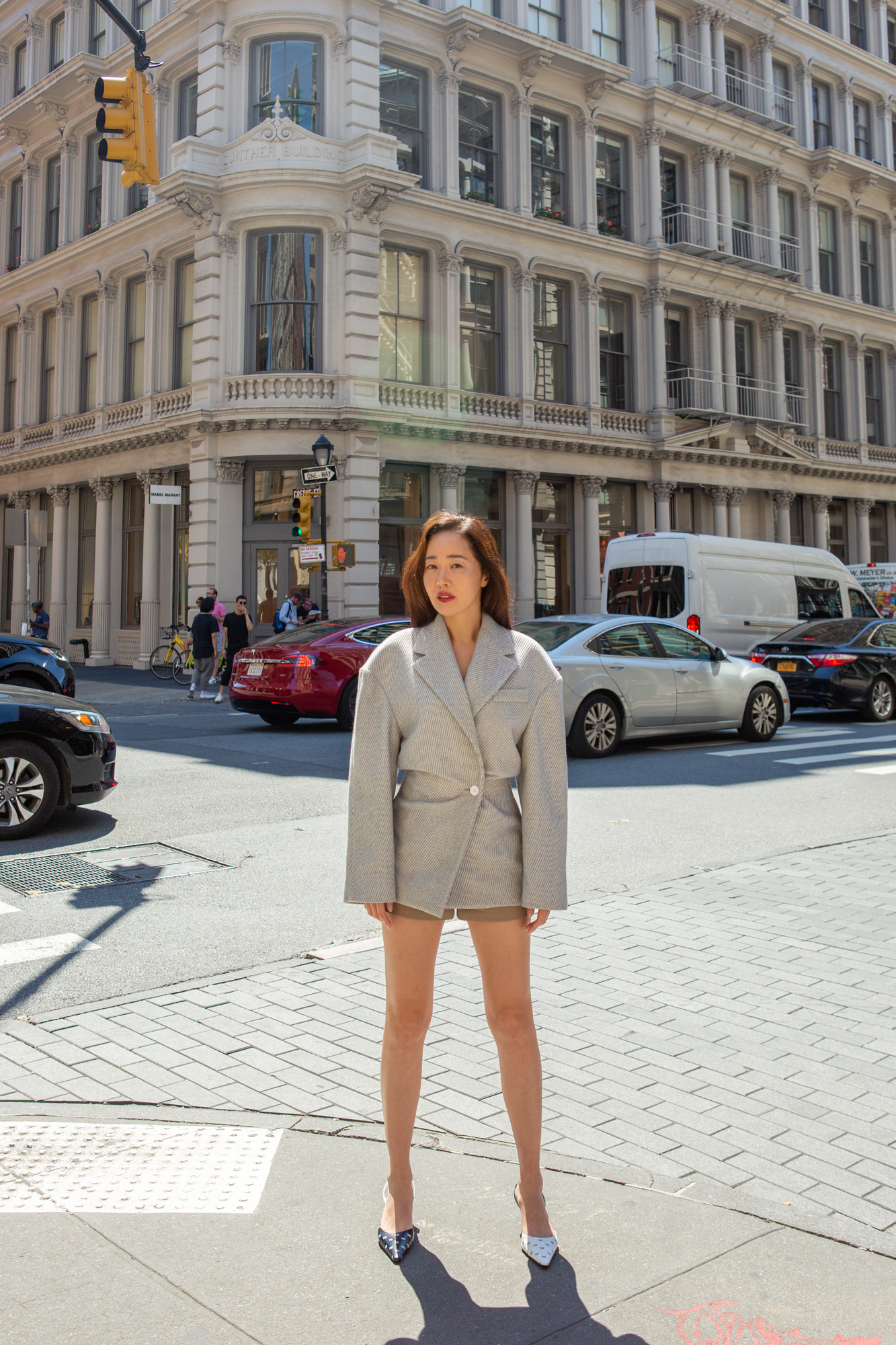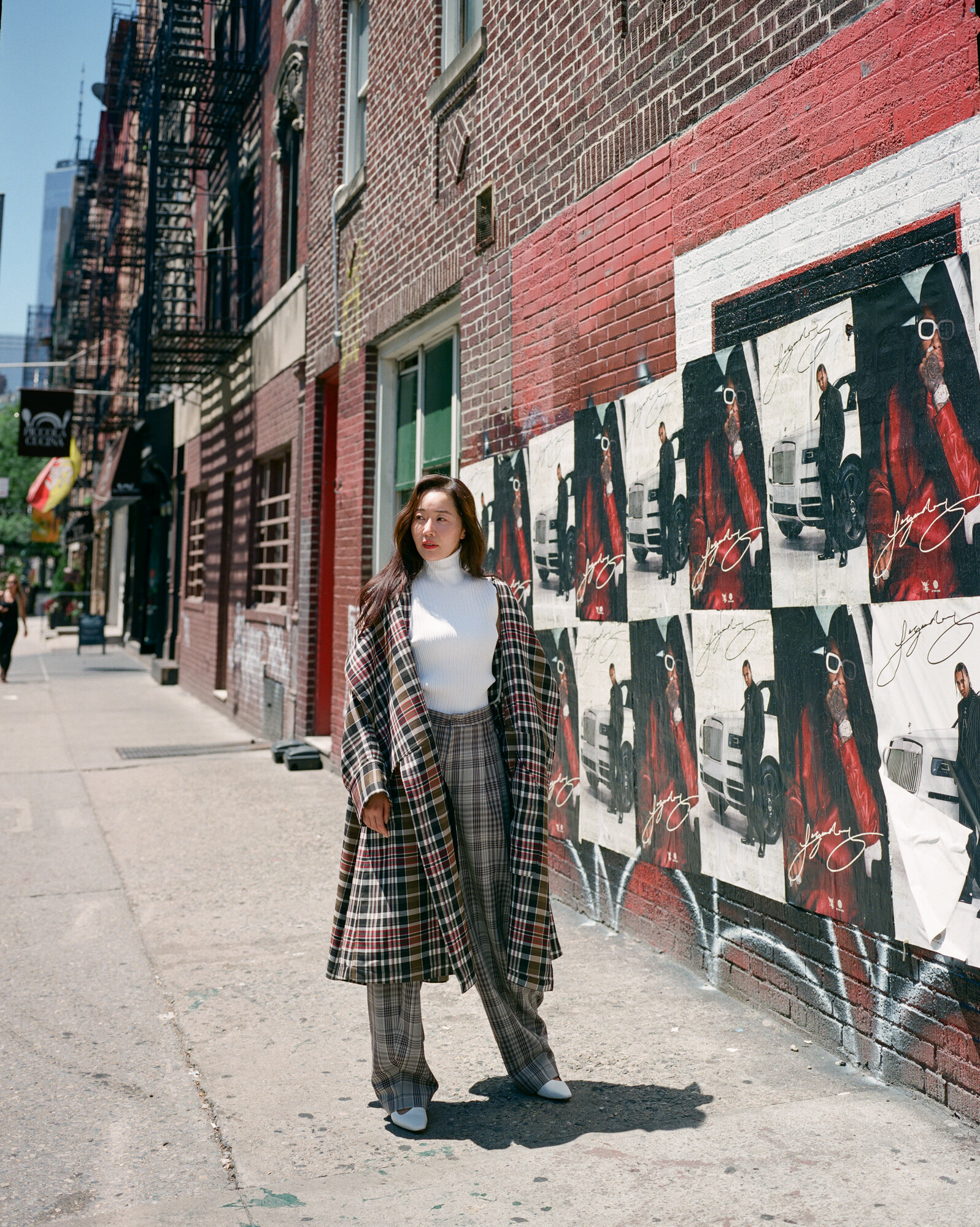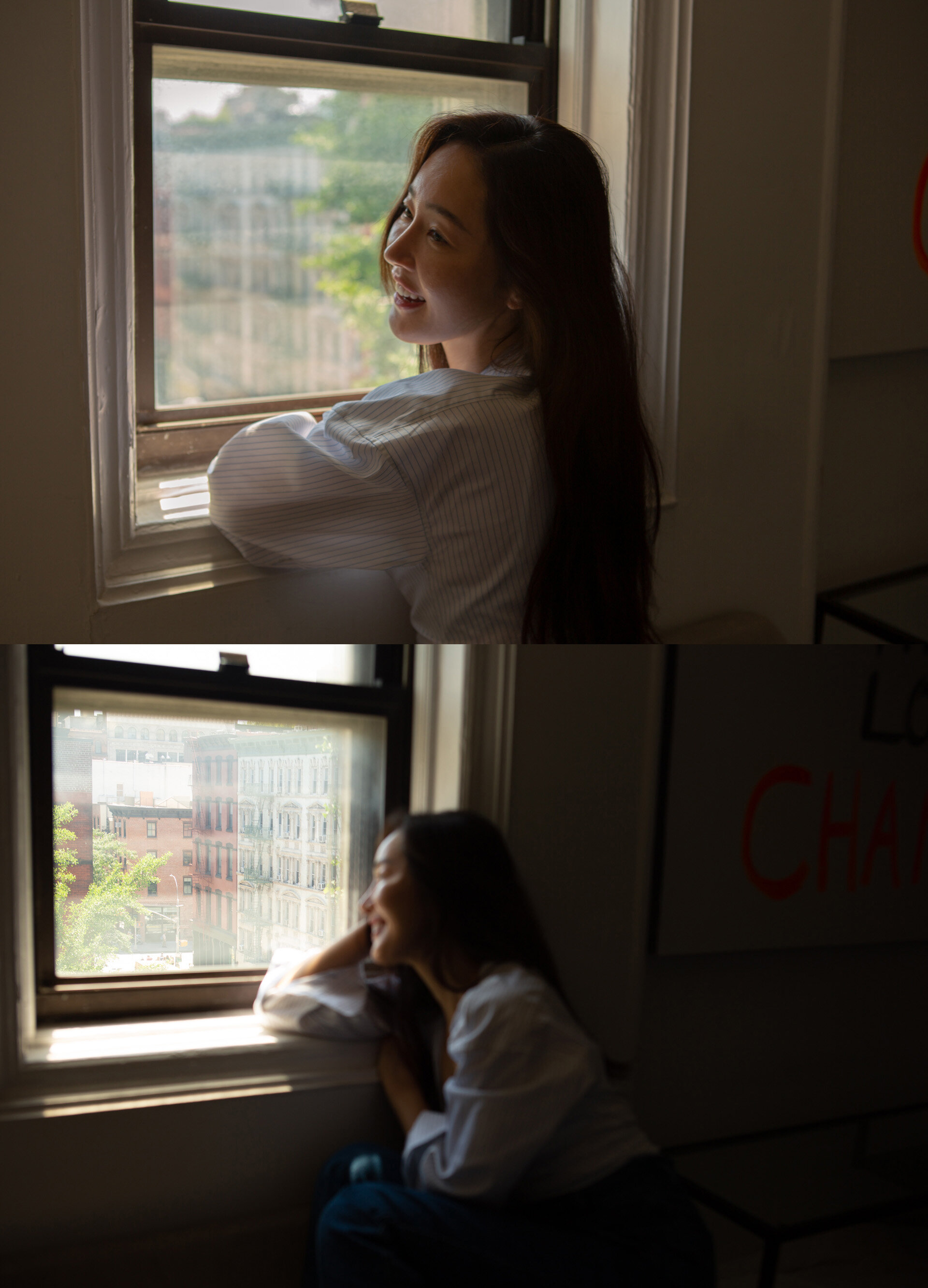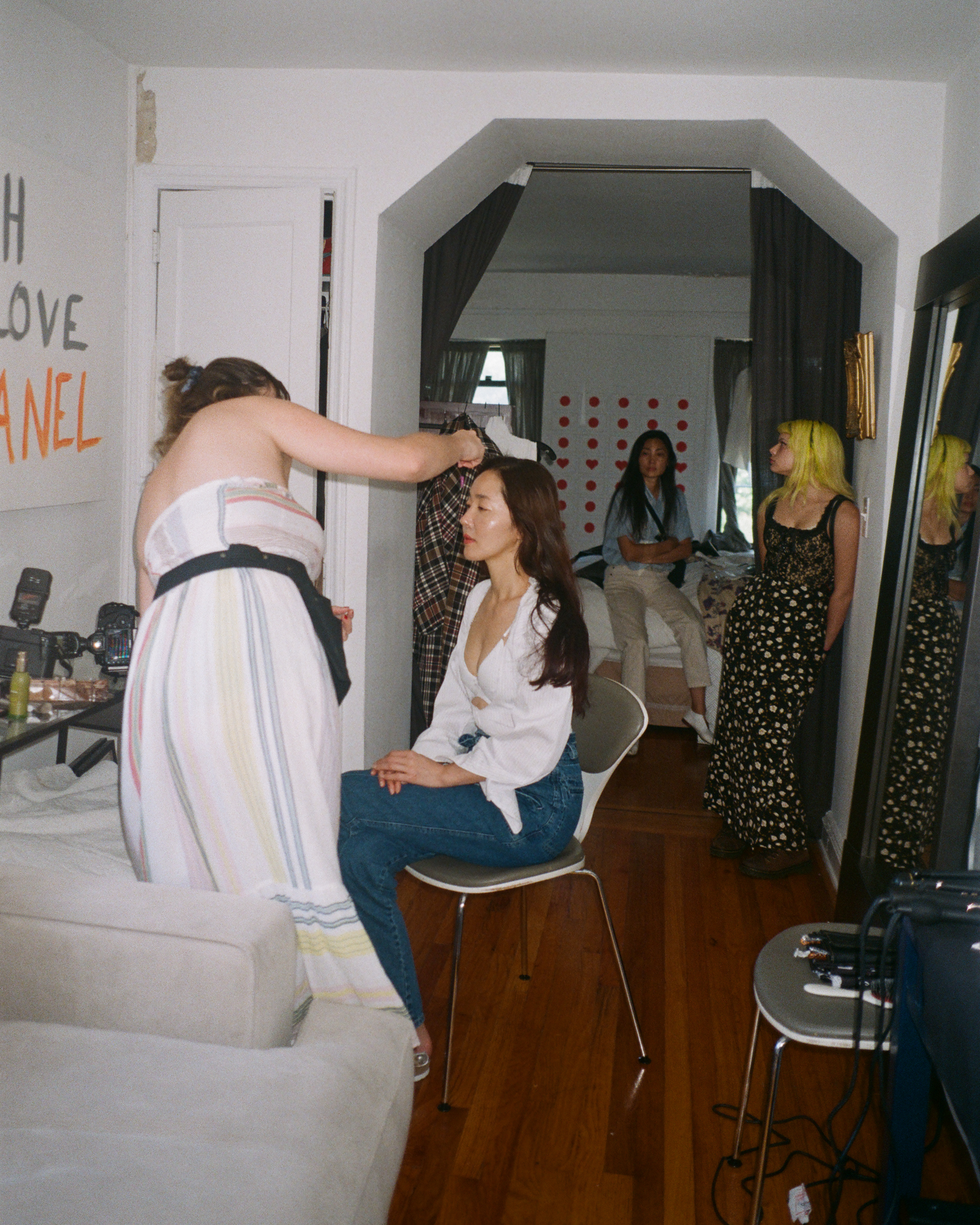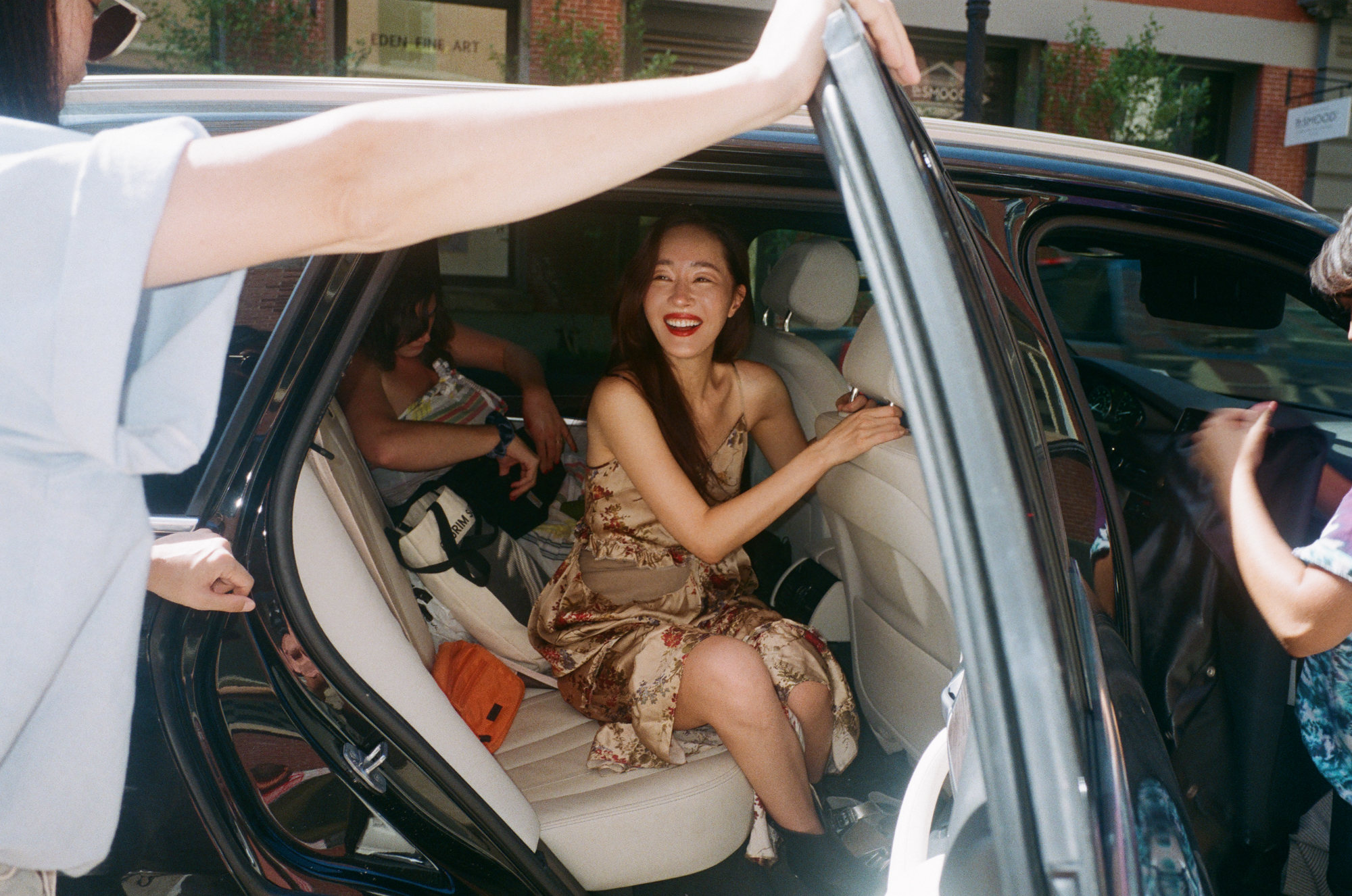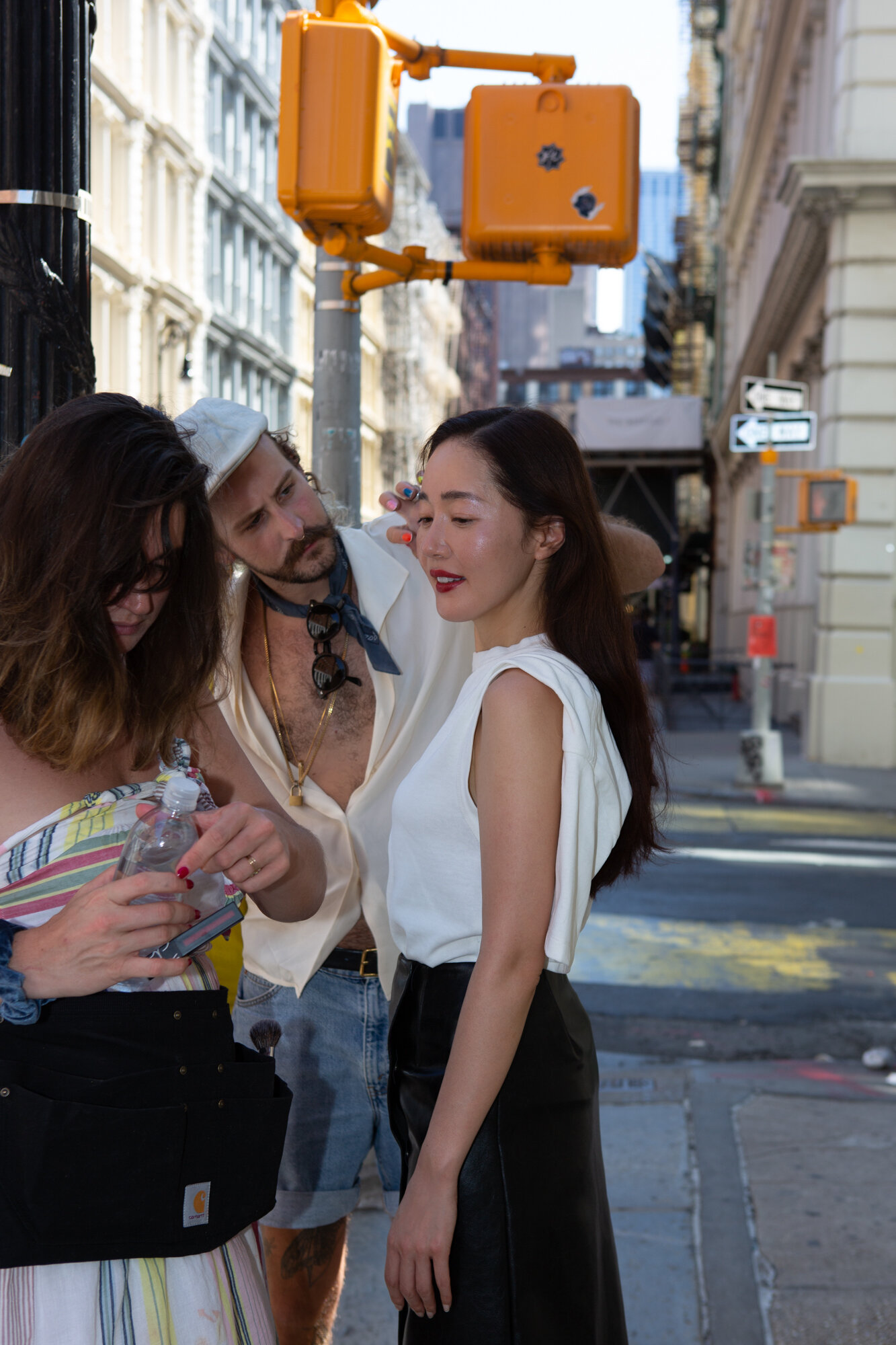Golden Time, Jiwon Uhm
photography by ji Yeo
Photography & Production: Ji Yeo
Hair: Bibb J. Dickey
Film: Colin Morvan
Styling: Aeri Yun
Make Up: Rachael Krutchkoff
Assisted: Ana Gabriela Leon, Kenzie Hirsch
Interview: Ji Yeo
Translation: Phoebe Lee
TOP BY ALEXANDER WANG
With the sun shining in New York City, actress Jiwon Uhm traces her history in motion pictures. Stretching a great 21 years now, the star – most recently seen in South Korean fantasy comedy T.V. series Spring Turns to Spring and the absurdly funny horror-comedy film The Odd Family: Zombie on Sale (and heard as the voice of a driver for the Japanese anime movie Doraemon: Nobita’s Chronicle of the Moon Exploration) – goes on to talk frankly about her commitment to pushing limits and realizing life’s homework.
From the moment Uhm and her seven-person-crew meet one early July morning in Manhattan invigoration grows. She’s a stellar performer who’s found outstanding praise since Uhm’s breakthrough role in the high-charged erotic thriller The Scarlet Letter (2004), and was nominated for Best Supporting Actress at the Blue Dragon Film Awards.
“After that short while, the ‘I want to become an actor’ turned into ‘I want to become a better actor’ and so on.”
She later won a Marie Claire Award in 2018 for Best Actress in the $7.8 million psyche-mystery Missing (2016), a Chunsa Film Art Award in 2016 for Best Supporting Actress in The Silenced (2015), and Best Actress at the 36th Golden Cinema Festival in 2016 for The Phone (2015).
Uhm agrees that if it wasn’t for the opportunity to, at last, ask herself what she, wanted, “I think I would be more like ordinary Korean people who live ordinary lives. Maybe I would have become a housewife, or a career woman for a while but stop working to become a housewife … one of those two.”
JACKET BY ACNE STUDIOS
Ji Yeo: First, can you introduce yourself to our American readers? Where you were born, how you got started.
Jiwon Uhm: I am an actress based in Seoul, Korea. Is that okay? Or should I state where I was born?
JY: Yeah, so just imagine introducing yourself to someone you’ve never met. Korea is so well-known and popular now that many American fans might recognize.
JU: How should I do this? [laughing] I was born in Busan, South Korea. Well, I moved shortly after I was born so I don’t remember Busan much. I spent half of my life in Seoul, and grew up in Daegu.
JY: Something we’re really curious about is what kind of child were you?
JU: I was very ordinary child who never stirred up any trouble that parents really liked.
JY: So were you very studious?
JU: Was I? [laughing] I guess I wasn’t super studious, but I still did well in school.
JY: So you weren’t a trouble maker at all?
JU: Yeah, I was a pretty average kid that followed all the rules of the Korean education system at the time. I feel like since my job is to live the lives of different characters and create characters in a way, too, and as much as Koreans say we’re a multi-ethnic nation, we’re still very mono-ethnic; most of the country still shares similar ethnic physical features. And I’ve grown up with Korean people around my whole life. So, as much as I might have heard of or read about all of the diversity in this world growing up, to actually see it in places like New York (which is such a good example of America’s melting pot), is especially different and really helps opens my eyes to all of the variety there is that the world has to offer. It in turn helps me have a more global input within my work in my home country. So in a way, traveling around has really made me realize the true “average-ness” of my life growing up.
JY: I’m curious about how you were in middle school? In Korea where you’re supposed to obey teachers and parents, and do everything they say, even when that’s not right or rational. During this time in your teens, did you go through any rebellious phases? Was there ever a special interest or any dreams you had?
JU: No, no, no. Not at all. I don’t think I even went through a huge puberty moody phase either.
JY: Wow, your parents are lucky!
JU: And now that I think about it, I don’t think I had any special dreams or interests I wanted to follow. But I don’t think anyone really asked me, either. You know those typical questions: “What do you want to be?” “What do you like?” “What do you like to eat?” “What kind of clothes do you like to wear?” I once received some spending money and had bought some clothes I liked. When my mom saw that I had spent the money on clothes, she was really surprised. Shocked even.
JY: Yeah at that age, usually moms tend to go out to buy clothes.
JU: Yeah. So with things like that, if I ever have a kid, I’ll probably ask those questions a lot, but no one really asked me growing up. Not even at school. Remember you’re not supposed ask questions at school. Maybe they weren’t curious. Maybe they didn’t care? I thought maybe I didn’t have any dreams or likes or dislikes, but maybe I just wasn’t sure what they were because no one ever asked me about them?
JY: What was your high school experience like?
JU: In high school, we had school-wide goals – I’m not sure if it’ll match American culture, but it was to get into a good college. Since that was the ultimate goal, I didn’t really think about my personal interests or pursuing anything like that. I just studied a lot and went to academy after school whenever I was told to go, since that was my mission. We didn’t really think that something outside of getting into a good college could be a possibility. And since I went to high school in Daegu, which is a more conservative town, no one really thought about anything more. Even when we went into high school, they divided us into different level classes. So, first years’ goals were to get into advanced classes, and starting the second year the goal was to get into a good college. Because of this, I don’t think there was any time to think about what I wanted, or even ask questions about myself.
JY: I think that is a very typical Korean education system. I went through it, too. I bet a lot of American readers can be shocked to hear about this.
JU: You think so? I do think that times are changing though. People are also constantly evolving. I know that nowadays young people are given a little bit more freedom to think about themselves and what their personal goals [and] hobbies are. Parents’ mindsets are also changing, as well as teaching methods.
FLORAL DRESS BY R13, SHOES BY ASH
JY: So then when did you start asking yourself those questions?
JU: I think when I started acting because I didn’t start acting to be a famous actor. I got scouted on the street when I was in college, which I think was more common back then. You would hear stories of people being cast in roles on the street and they get their pictures taken, blow up and become huge celebrities. I never thought about being an actress but people kept telling me to do it and thought maybe I could do it for a year or so. As I started in the industry, I really started asking myself those questions about my own personal goals based on the options that were available to me at the time. Before then, I didn’t really have the opportunity to make my own decisions on my future. [It] was more like me following goals and rules that were already made for me. After I turned 20-years-old, I had the opportunity to make my own choice although I didn’t expect to be doing it for close to 20 years, it was definitely something that I had wanted to pursue, just for a short while. After that short while, the ‘I want to become an actor’ turned into ‘I want to become a better actor’ and so on. I think that I was able to ask myself those questions because I was able to make my own choice. The more choices I made, the more I reflected on what I wanted, what I liked, what I wanted to do. If it wasn’t for those choices or the opportunity to make those choices, I think I would be more like ordinary Korean people who live ordinary lives. Maybe I would have become a housewife, or a career woman for a while, but stop working to become a housewife … one of those two.
JY: What was your first job after you got scouted?
JU: There was a movie called Mutt Boy that Kyung Taek Kwak was directing so I auditioned for it. They saw it and liked it and we all agreed to work together.
JY: How was it as a young actress trying to get started in the industry and as your first job? Working with the director (he was still really popular back then, too, right?) and the other actors?
JU: Yes, he was really popular. It was my first audition for a movie role, but I had been working on a drama before, so it wasn’t that new to me. And since I was still so young, I think my mindset was to try things out and just have fun with whatever role comes my way. I didn’t hold super high expectations for much in the beginning. It was never like, ‘I really hope this does well', it was more like, 'Huh, look at that, this might actually work out?’ I just really loved doing what I was doing. And in all honesty, I would have been okay with it if it didn’t. It made me really content to not hold onto those kinds of feelings.
JY: So then that drama you had been working on before the movie was your first job ever?
JU: Yeah, so it was a morning drama series called Golden Wagon. I auditioned for the show and ended up playing the main character.
JY: Wow, how did you get the lead role?
JU: I’m not sure if it would be called an audition, but what happened was that the director had a small role that I came in to audition for. However, he kept asking me to do other things. I was wondering why he was asking me to do all of these other things. [laughing] I guess his thought process was that instead of the small role I had come into play, he thought the main lead would be a better character for me. And since I didn’t have any other experience prior to this, he was testing my abilities in his own way. So he called me a few more times like this after that. All of a sudden, he asked me to play the main role and I was like, ‘What? There were so many other people who didn’t even make the smaller role, and I ended up as the lead?’
JY: But you know people who have been working in the industry in those positions for a while have done it so much that once they see someone — even for a few seconds — they know their potential.
JU: Yes. So, that’s how I started my career. In my opinion, I think if anything is to happen, it will happen very naturally. No matter how hard you try there will be instances where things don’t work out. It doesn’t necessarily mean that it was a bad experience, because it didn’t work out, it just didn’t work. On the other hand, I think those really successful instances happen so easily. I mean not easy as in I didn’t try at all, but I’ve done all I could do and everything else ends up falling into place smoothly. There definitely needs to be some sort of effort on a basic level.
JY: Before you got casted, had you been taking acting classes or practicing at all?
JU: Yes, I was. I had an acting teacher about eight years after I debuted. The teacher didn’t “teach me how to act” per se, we spent a lot of time talking about how to analyze and understand the thoughts and ideas of different characters. Later on, instead of having a teacher, I spent more time discussing how to effectively communicate with directors and other actors on any set that I was on. I worked on changing my approach, since I was so inexperienced in the field. I was really nervous and wasn’t always sure if I was allowed to talk to the directors and co-actors about any questions that I had. I thought I had to prepare just my part and arrive on time. So I worked on that a lot.
COAT & PANTS BY DEREK LAM
JY: Taking a look at your filmography you’ve played a variety of roles. A lot of actors like to pursue similar roles, like pleasant and pretty ones but you’ve chosen to be a lot of characters who are broken or have really strong personalities so different from yourself. Is there a process or a standard in choosing your roles?
JU: I don’t think there’s a particular standard or a process for me …
JY: But the way you bravely choose to be certain character is really interesting.
JU: In the beginning, there weren’t many expectations for me from others. Even if I didn’t do well, it wasn’t very disappointing to anyone. But of course, when an actor chooses a role, it’s because they really want to play that character — so much that they’re willing to dedicate months to said character. It’s kind of hard when there are a few options laid out for you, too. So when I had to choose, I picked some difficult roles at first. I knew I’d be better at some of the easier roles, but looking forward in my career, I felt like it’d be embarrassing when I got older and wasn’t able to portray a particularly hard character effectively. Especially if my name was more well-known and there were more expectations for me in general. I thought that maybe just giving more difficult roles a try, and pushing my limits as an artist in the beginning, would be better when I was less known, even though I had zero confidence in myself. Let’s say there are two types of roles — one that’s just… me. I can do this with no problems. The other role is one that makes me question my own abilities, but I really want to give it a go. To me, I guess I can broadly categorize roles into these two big groups and as I was starting off, I found myself choosing the latter. I think as I kept choosing more challenging roles, it eased a lot of the fear that I had.
JY: That is amazing. Being vulnerable with no confidence especially in the industry you weren’t familiar with.
JU: Well, I guess that was a good move because it helped calm a lot of my nerves but as my filmography added up, and looking back at it, I don’t think one thing can be completely good … there are always pros and cons to every choice in life. So when I look back at Jiwon Uhm, I don’t think there’s a particular acting image that pops up. I feel like I’ve done so much that I’m not sure what I’m good at. [laughing]
JY: I understand why you might think that.
JU: You know when people talk about other actors, it’s like, “Oh, she’s the romantic comedy queen” or “He’s THE action actor!” Or, “They’re a comedy genius” and things like that. I know trends are constantly changing, but I think the trend right now is like a defined personality or trademark for celebrities and when it comes to me I’m not sure if I have one… almost like “Jiwon Uhm … what is she good at?”
JY: I think like you talked about before, just the mere fact that you didn’t choose the safe, ordinary path and you chose the new and uncomfortable one says a lot about you and your trademark personality. It’s anything but ordinary.
JU: My favorite word [of many] is “filmography.” I’m not sure if American fans would understand this, but Koreans get a good read on the actor as a person from looking at their filmography. It’s not about each project individually, but they look at it more collectively. I mean, I never thought I’d be here, 20 years into an acting career, and I have no idea how much longer I’ll be doing this, but I guess looking back at my filmography then would do something for Jiwon Uhm, right?
COAT & PANTS BY DEREK LAM
JY: I mean, backtracking a little bit to your previous response, I think a special trademark for you would be an actress who takes her role seriously. If you look at movies like The Silenced, and Hope, they would not have had the same effect on the watchers if it wasn’t for depth in the characters that you portrayed. Missing was also really good. And personally, I wasn’t expecting you to play the role you have in the Odd Family.
JU: Honestly, for me, those kinds of roles are really fun to play, the characters that are broken or the ones that are so different from myself. People didn’t really respond much to me playing such a role, though. It made me think maybe people like pleasant and pretty things after all.
JY: Personally looking through the audience’s perspective, I remember thinking, 'Wow, Jiwon Uhm took really take risks.’
“These days, I’ve been thinking more about what I want to do versus what the public wants me to do.”
JU: The character was such a non-feminine, cold character that I was a little surprised at the lack of response from audiences. And usually, there’s less response when I do something less pretty. If I play a character that’s feminine and pretty, there’s more response. I used to think a lot about what I could do to become a better actress. These days, I’ve been thinking more about what I want to do versus what the public wants me to do. Right now I am certain I know what I want but I have no idea what the public wants from me. And it’s not like the public is going to tell me what they want, right? It’s hard.
JY: I know being a celebrity and being an actor is a little different, but I think celebrities are good at selling a particular image to the public. I think actors tend to be more themselves to the public. You need a sort of balance.
JU: As an actress, if I want to pursue a certain role that interests me, it’s going to be through a certain level of stardom [or] popularity that’s going to get me to the role that I want. I think it’s kind of a necessity, same with celebrities. You can’t have one without the other.
JY: I agree with you. I was pursuing fashion for a while but switched [to] fine arts. The biggest lesson that I learned was the importance of balance. Because no matter how hard you pursue fine arts, if no one pays attention to your art there’s no point.
FLORAL DRESS BY R13, SHOES BY ASH
Let’s switch the atmosphere a bit here. Do you have any routines or rituals you do to get ready for a role?
JU: Going into a job is different depending on which set I’m going to. . However, leaving a set at the end of a project is almost always the same. I go abroad. The reason is pretty simple. Working on a set, you’re in the same environment for an extended period of time. If I stay in Korea after shooting a film, I feel the remnants of the character I played remain with me. I think if you want to be an actor for a long time, the healthiest thing you can do is to put all of your focus and attention to a character when you play them and then try to let go of them as soon as possible, after you’re done shooting. You don’t need to hold onto a character after filming is done. I think an actor who knows how to send off their characters at the end of each project is a healthy actor.
JY: What did you do before you went into the Silenced?
JU: For that, the first thing I did was study Japanese since the film is set during Japanese colonial-era. I watched a lot of Japanese dramas and got accustomed to their language. The timing of the film was really important to the story itself. Appearance was also really important for the film, too. Honestly, the two biggest first impressions for a person are appearance and personality. Personality is usually already predetermined in each story, but appearance is not always predetermined. Short hair, long hair, hair color… a lot of possible changes to appearance which might be why some may say Western better because they have so much more flexibility in changing their appearance for a role because Western is so multi-ethnic. A character can be that character with short hair, red hair, different eye colors, etc., whereas our options are way more limited. If we change even a little bit, we might look too different from the character we are portraying. We’re pretty disadvantaged in this way because I feel like there can be so much more potential in the characters we try to portray if we could change our appearance a little more. Our only options for hair color are like light brown, dark brown, or black, and even with color lenses, there’s only so much we can change to still remain natural. So for that character, I focused a lot on her appearance and what clothes she’d be wearing and what kind of make-up she’d be wearing because if it is, too, unnatural it would have to be rewritten. And after all of that has been established, is when I try on the character.
JY: Wow so actors actually have a lot to do in character development behind the scenes, too. It’s not just like you walk into hair and makeup every day pre-decided and then be ready to play a character.
JU: If you do it like that then my thoughts on a character might be different from the writer or director’s, so it’s just all for smooth communication amongst everyone that we are all on the same page. But hair and makeup were really important for that character. In contrast, in Hope, it was almost no makeup. Sometimes it’s just better for the character to go without. Anyways, thorough communication with everyone on the team makes it even easier for me to become the character.
TOP BY ALEXANDER WANG
JY: Onto a lighter topic, what is something in your life that makes you smile?
JU: My puppy!
JY: I already knew that. [laughing]
JU: What makes me happy? Loving things (and people) whole heartedly. Even though that’s a natural part of life. There’s love between a man and a woman, between friends, even with food! You know, let’s say I love coffee. What happens when I drink coffee? I get really happy! So simple. If I love a small piece of jewelry, it brings me joy every time I wear that piece of jewelry. I think the more things I like and love, the happier I become.
JY: What’s one of your Korean movie/dramas you’d recommend to American viewers?
JU: One recommendation? What a tough question. I’d have to say the The Odd Family: Zombie on Sale. It’s a comedy and it’s been really well received by oversea viewers.
JY: Dramas are good, too, since they’re so popular these days.
JU: Oh really? Are they all available?
JY: Yeah and pretty accessible!
JU: What about Spring Turns to Spring!
JY: Final question. Do you have any advice for 20s and 30s who’s struggling to find what they love and what to do in their career?
JU: Find a career that you love and that will make you happy. Finding that career is your life’s homework that you have to figure out. And have fun while doing it. I know it’s “work”, but there’s no way you’d survive without working. So if you need to work, focus on what you like and what makes you happy over how much money you make. If it’s something you really love, it will connect you to money. And even though you might not know how long it will last, at least you’re happy during it no matter how little money you earn.
TOP BY ALEXANDER WANG, LEATHER SKIRT BY ASSEMBLY NEW YORK
